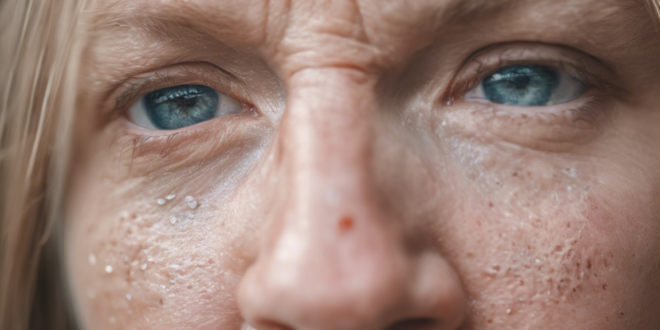Understanding Seborrheic Dermatitis: A Holistic Approach to Management and Healing
Seborrheic dermatitis is a complex skin condition that affects millions of Americans, causing discomfort, embarrassment, and ongoing frustration for those struggling with its persistent symptoms. Recent research suggests that a comprehensive approach addressing both nutritional and emotional factors may offer significant relief and improved management of this challenging skin disorder.
The Complex Nature of Seborrheic Dermatitis
Seborrheic dermatitis is more than just a surface-level skin problem. It’s a chronic inflammatory condition characterized by red, scaly patches, greasy or dry scaling, and sometimes intense itching. Typically appearing on areas rich in sebaceous glands such as the scalp, face, chest, and back, this condition can significantly impact an individual’s quality of life and emotional well-being.
Nutritional Factors: The Internal Connection
Emerging research indicates that diet plays a crucial role in managing seborrheic dermatitis. Nutritional deficiencies and inflammatory dietary patterns can exacerbate skin symptoms, making dietary intervention a potential game-changer in treatment strategies.
Key nutritional considerations include:
• Omega-3 Fatty Acids: These anti-inflammatory compounds found in fish, flaxseeds, and walnuts can help reduce skin inflammation and support overall skin health.
• Zinc: A critical mineral for skin repair and immune function, zinc deficiency has been linked to increased severity of seborrheic dermatitis.
• Vitamin D: Low vitamin D levels are commonly associated with increased skin inflammation and may contribute to symptom progression.
• Probiotics: Emerging evidence suggests that gut health significantly influences skin conditions, with probiotic-rich foods potentially reducing inflammatory responses.
Emotional Health and Skin Conditions
The connection between emotional status and skin health is profound. Stress, anxiety, and depression can trigger or worsen seborrheic dermatitis through complex neuroimmune pathways. Chronic stress leads to increased cortisol production, which can:
• Suppress immune function
• Increase inflammation
• Disrupt skin barrier function
• Exacerbate existing skin conditions
Comprehensive Management Strategies
A multi-faceted approach offers the most promising results for individuals battling seborrheic dermatitis. Integrating medical treatments, nutritional interventions, and emotional support can create a powerful healing framework.
Medical Treatments
Traditional medical interventions remain a cornerstone of management:
• Topical antifungal creams
• Medicated shampoos containing zinc pyrithione or ketoconazole
• Corticosteroid creams for reducing inflammation
• Prescription-strength treatments for severe cases
Dietary Recommendations
A targeted nutritional approach can support skin healing:
• Incorporate anti-inflammatory foods
• Reduce processed sugar and refined carbohydrates
• Increase intake of omega-3 rich foods
• Consider targeted supplementation under medical supervision
• Stay hydrated with adequate water intake
Stress Management Techniques
Emotional well-being plays a critical role in skin health management:
• Regular meditation and mindfulness practices
• Cognitive behavioral therapy
• Exercise and physical activity
• Adequate sleep hygiene
• Professional counseling if needed
Lifestyle Modifications
Additional lifestyle strategies can support overall skin health:
• Maintain consistent skincare routine
• Use gentle, fragrance-free products
• Manage humidity levels
• Practice good hygiene
• Avoid triggers like extreme temperatures
When to Seek Professional Help
While many individuals can manage seborrheic dermatitis through holistic approaches, professional medical consultation is crucial in certain scenarios:
• Persistent or worsening symptoms
• Significant emotional distress
• Signs of secondary infection
• Extensive skin involvement
• No improvement with initial interventions
The Future of Seborrheic Dermatitis Management
Ongoing research continues to unveil the intricate relationships between nutrition, emotional health, and skin conditions. Personalized medicine and advanced diagnostic techniques promise more targeted and effective treatment strategies in the future.
Conclusion
Seborrheic dermatitis is a complex condition requiring a comprehensive approach. By addressing nutritional deficiencies, managing emotional health, and implementing targeted medical treatments, individuals can significantly improve their symptoms and overall quality of life.
Remember, healing is a journey. Each person’s experience with seborrheic dermatitis is unique, and patience, self-compassion, and professional guidance are key to successful management.
 Good Calories Guide GoodCalories Guide focuses on nutrition, healthy eating, and overall wellness. The site offers practical insights into evidence-based dietary practices, including tips for specific lifestyles such as veganism, keto, and family-friendly meal planning. It also addresses unique nutritional needs for individuals with conditions like diabetes or food allergies, while providing quick and accessible recipes to make healthy living a sustainable and enjoyable choice.
Good Calories Guide GoodCalories Guide focuses on nutrition, healthy eating, and overall wellness. The site offers practical insights into evidence-based dietary practices, including tips for specific lifestyles such as veganism, keto, and family-friendly meal planning. It also addresses unique nutritional needs for individuals with conditions like diabetes or food allergies, while providing quick and accessible recipes to make healthy living a sustainable and enjoyable choice.


